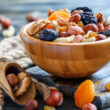If you’re among the millions of people who suffer from allergies, you know that relieving symptoms can be tricky and frustrating. You may think you’ve looked everywhere for relief, but have you tried your refrigerator?
An allergy is your body’s reaction to something you’ve eaten, touched or inhaled that it doesn’t like. To protect you, your immune system releases chemicals called histamines. The trouble is, these substances cause inflammation and lead to the coughing, sneezing and itchy eyes that can annoy you for days or weeks. Fortunately, eating the right foods can help you put up a good fight naturally.
“A person suffering from allergies can also experience eczema, skin rash, gastric upset, constipation and/or diarrhea,” says Rebecca Mohning, a registered and licensed dietitian and the owner of Expert Nutrition, a wellness management service in Washington, D.C. “Nutrient-packed foods provide immune-boosting and anti-inflammatory properties to prevent some allergies or lessen the effect of allergies.” Try these heavy hitters to help you eat your way to allergy relief:
Yogurt
Yogurt regulates your immune system and keeps it stress-free. It contains probiotics (good bacteria), which “restore the balance between good and bad bacteria in your body,” says Mohning. Studies show that probiotics have the potential to alleviate allergy symptoms such as eczema. Have a cup of fat-free or low-fat yogurt in the morning. If you can’t tolerate dairy products, Mohning says you can get the same benefits from an over-the-counter probiotic supplement.
Sweet Bell Peppers
Vitamin C plays a crucial role in stimulating the immune system. It can also help reduce inflammation and lower the production of histamine, which causes allergy symptoms like watery eyes. But don’t head for the fruit stand if you want to up your intake of this allergy-fighting vitamin — pick peppers instead. Red and yellow varieties contain more than twice as much of the antioxidant as oranges and strawberries. For an easy way to incorporate these in your diet, try putting some pepper halves on the grill at your next barbecue.
Salmon
Omega-3 fatty acids are widely known for improving heart health, but “they also have anti-inflammatory properties that provide relief to inflamed sinuses or dry skin from eczema,” says Mohning. Studies have shown that increased intake of omega-3s reduces rates of hay fever. Salmon is an excellent source of the essential acid. It’s also one of the best sources of vitamin D. “There is a relationship between low levels of vitamin D and the occurrence of allergic diseases,” adds Mohning. One study even linked the onset of allergies in children to low vitamin D levels.
Spinach
Popeye had the right idea: Spinach is an allergy-fighting powerhouse. It contains a special combination of antioxidants, such as quercetin, that boost its anti-inflammatory value to unique levels. It also has high levels of zinc, which has been shown in studies to help combat allergies as well as asthma. Plus, it’s a good vegetarian source of omega-3 fatty acids. Try a spinach salad with peppers for lunch.
Cherries
Indulge in luscious cherries this summer: Plant pigments called anthocyanins are what give cherries their deep red color, and they can also give you relief. A study in The Journal of Nutrition found that eating cherries daily may significantly reduce inflammation, which in turn can reduce allergy-related pain and discomfort. If you can’t find fresh cherries, look for frozen or dried varieties, or try cherry juice.







